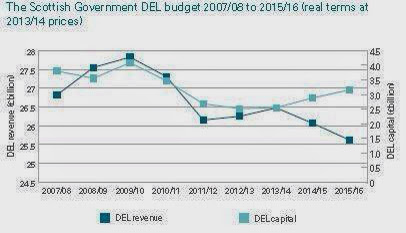Creating a human rights culture in Scotland is challenging in the current environment, but that doesn't mean we shouldn't be doing more to embed them in public service delivery.
I was speaking at the Human Rights Consortium Scotland (HRCS) conference in Glasgow today, 'Delivering Human Rights - A Constitution for Scotland?'. My contribution was on the culture of human rights in Scotland.
Sadly, the short answer to the question posed is that we don't have an embedded human rights culture in Scotland. Most of the organisations our members work in have statutory responsibilities under the legislation, but most staff would have only a vague understanding of what this means. This understanding is stronger in professions like police, social work and nursing - but limited elsewhere. As the work of the HMRC has shown, this reflects a wider ambivalence and misunderstanding amongst the wider public. Daft media coverage doesn't help as evidenced in the 2012 study by the University of Glasgow.
Specific measures, awareness and capacity building are not widespread and in a recent consultation few members were aware of recent initiatives such as the SHRC National Action Plan on human rights. Our experience of impact assessments is that they have too often become tick box exercises, completed after the key decisions have been made. For example, there is some mitigation of the impact of cuts on disadvantaged groups, but limited measurement of outcomes.
We need to integrate human rights into the decision making process. Greater use of the FAIR approach would help:
●Facts – experience of the individual
●Analysis – of human rights at stake, absolute or restricted
●Identification – what changes and who has responsibility
●Review – Recorded & reviewed with individual affected
This also requires better training for staff and decision makers.
Another idea considered by the HMRC is that every public service worker should be required to take a human rights oath, modelled on the Scottish police constable oath. The primary aim was to provoke a debate on how we might embed a human rights culture. It certainly achieved that, but our members had some concerns. The logistics of swearing in 500,000 plus staff would be significant, including the time and cost to brief staff at a time when resources are stretched to breaking point. It would also need to include others in the private & voluntary sector who deliver public services. We would also be concerned about double or even triple jeopardy in disciplinary proceedings, with employers passing the buck for their own responsibilities to the workforce.
These concerns reflect the fact that the biggest barrier to human rights in Scotland is the cuts in public spending. With 50,000 jobs cut and many more to come, together with £6bn to be slashed from the Scottish Budget, human rights are coming under pressure like never before. UNISON's 'Time to Care' report into social care is a good example of how the human rights of service users and staff are being ignored in large parts of Scotland. Welfare cuts are another obvious example of how human rights are being sidelined.
The good news is that human rights is less of a political football in Scotland, avoiding the Tory ministers attacks at Westminster that portray human rights as an alien culture. The Deputy FM Nicola Sturgeon addressed today's conference and pointed to the Scottish Government's draft interim constitution that embeds human rights. While others would argue for a different constitutional approach, there is less difference over the principles. However, if we vote for independence in September, there will be a real debate about how interventionist the constitution should be on issues like human rights, as against a limited description of constitutional authority such as the USA.
Constitutions are fine, but as delegates at today's conference raised, there needs to be education, capacity building and effective legal remedies given the social class and attitudes of our judges. If we look at the use of judicial review in Scotland, it's rarely used outside of immigration and commercial planning challenges. Even when a case does get to the Scottish courts, 75% are unsuccessful.
For trade unionists human rights is at the core of what we stand for. Employment rights are very limited in the UK and charges for ET applications are removing access to justice. As a senior trade union official I am painfully aware that however robust my organising, bargaining and campaigning may be, I can go home at night in safety. There are many comrades across the world who don't operate in a human rights environment and have lost their lives doing what I do ever day. That is why we should view human rights as of international importance and not be sucked into the isolationist approach of a UK Bill of Rights.
Human rights are not an optional add on, it should be at the core of what we do. We need to do more to build awareness and develop practical measures to embed human rights in our decision making processes.










